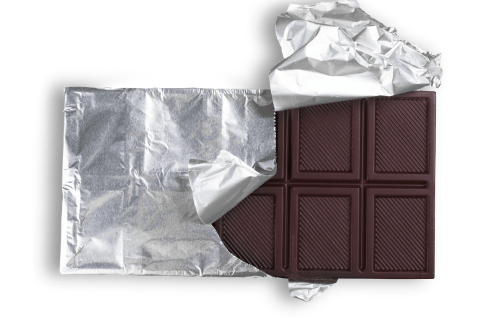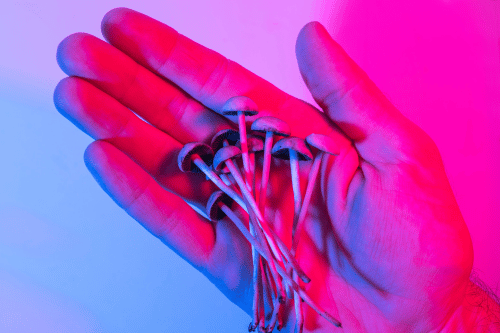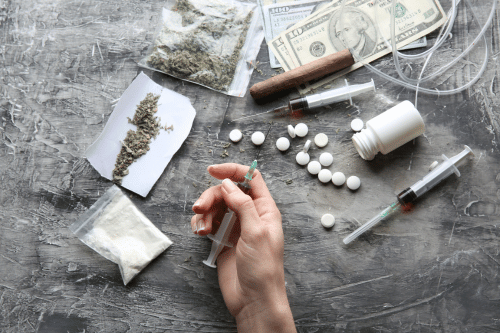

Mushroom chocolate bars are a trending novelty that combines the delight of chocolate with the mind-altering effects of psychedelic mushrooms. These bars, often containing psilocybin mushrooms, are marketed as a more palatable way to experience the effects of magic mushrooms, appealing to individuals curious about psychedelic experiences.
However, despite their seemingly harmless appearance, mushroom chocolate bars come with hidden dangers that can severely impact mental health and lead to addiction. As an addiction and mental health treatment provider, Sullivan Recovery seeks to inform and educate the public about the risks associated with these products.
Mushroom chocolate bars are infused with psychoactive substances, primarily psilocybin mushrooms, which are known for their ability to induce hallucinations, alter perceptions, and create profound emotional experiences. These mushrooms contain a psychedelic compound called psilocybin, which is converted into psilocin once ingested. Psilocin is responsible for the mind-altering effects that users seek when consuming these products.
Consuming magic mushroom chocolate carries legal and health risks, including potential legal consequences and mental health damage. The trend of consuming mushrooms in chocolate form has grown in popularity due to its ease of use and the pleasant taste of chocolate, masking the bitter and earthy flavor of magic mushrooms. However, while mushroom chocolate bars may be easier to consume than raw mushrooms, they are not without significant risks.
Psilocybin mushrooms, commonly referred to as magic mushrooms, are known for their ability to create intense, mind-altering experiences. Many users report feelings of euphoria, interconnectedness, and spiritual insight, while others may experience intense fear, anxiety, or paranoia. The effects of psilocybin can vary depending on the dose, the individual’s mental state, and the environment in which the substance is consumed.
When considering mushroom chocolate bars, it is important to address the question of how many magic mushrooms are contained in various bars, as the amount can significantly impact the effects experienced. Mushroom chocolate bars often contain varying amounts of psilocybin, making it difficult to determine the exact potency of each bar. This unpredictability can be dangerous, as consuming too much can result in a “bad trip”—a terrifying, panic-inducing experience that may last for hours. For individuals already dealing with mental health issues such as anxiety, depression, or trauma, these negative experiences can be particularly harmful.

While magic mushrooms have gained popularity in some circles as a tool for personal growth or mental well-being, the risks associated with them, especially in the form of mushroom chocolate bars, should not be overlooked. Many of these products claim to contain a ‘mushroom blend’ without clarifying the types and amounts of mushrooms used, creating ambiguity and potential safety concerns for consumers. The following are some of the key dangers posed by these products:
The potency of mushroom chocolate bars can vary significantly from one product to the next, making it difficult for consumers to know how much psilocybin they are ingesting. Unlike prescription medications, which are carefully dosed and regulated, mushroom chocolate bars are often made in unregulated settings, leading to inconsistent dosing.
There are potential discrepancies between the labeling and actual contents of mushroom chocolate bars, particularly in relation to mushroom extract and quality control issues.
Overconsumption can lead to intense and overwhelming experiences, including visual and auditory hallucinations, feelings of detachment from reality, and extreme confusion. These effects can last for several hours, during which time individuals may be at risk of engaging in dangerous behavior or experiencing psychological distress. In some cases, these intense experiences can lead to long-term mental health issues, such as post-traumatic stress disorder (PTSD) or exacerbated symptoms of anxiety and depression.
While magic mushrooms are not considered physically addictive, their psychoactive effects can lead to psychological dependence. Some individuals may find themselves repeatedly using mushroom chocolate bars in an attempt to recreate the feelings of euphoria or spiritual insight that they experienced during previous trips.
This pattern of repeated use can lead to a form of psychological addiction, in which individuals become reliant on the substance to escape reality or cope with stress, anxiety, or other emotional challenges. For people already struggling with addiction or mental health issues, this psychological dependence can be just as damaging as physical addiction to substances like alcohol or drugs.
Another significant danger of mushroom chocolate bars is the potential for polysubstance use. Many users may consume these bars in conjunction with other substances, such as alcohol or cannabis, in an attempt to enhance the effects of the psilocybin. However, mixing substances can lead to unpredictable and dangerous outcomes.
The effects of psilocybin are already potent and difficult to manage for some individuals, and adding other substances into the mix can amplify the risks. For example, alcohol can intensify the hallucinogenic effects of magic mushrooms, making the experience more disorienting and increasing the likelihood of panic attacks, confusion, or dangerous behavior. Additionally, the combination of substances can strain the body’s organs, particularly the liver, which must work harder to metabolize multiple compounds.

Psychedelic mushrooms, including those found in mushroom chocolate bars, have a profound impact on the brain. They interact with serotonin receptors, influencing mood, perception, and cognition. For individuals with mental health disorders, such as depression or anxiety, consuming psilocybin can exacerbate their symptoms rather than alleviate them.
The popularity and rising concerns surrounding ‘mushroom chocolates’ highlight issues of inaccurate labeling and potential health risks. Many products marketed as mushroom chocolates may contain unlisted psychoactive substances, leading to uncertainty about their true ingredients and effects.
In fact, people with a family history of schizophrenia or other psychotic disorders are particularly vulnerable to the adverse effects of psychedelic compounds. The consumption of mushroom chocolate bars can trigger or worsen psychotic episodes, leading to long-term mental health challenges.
While there is ongoing research into the potential therapeutic benefits of psilocybin for treating depression, it is important to note that these studies are conducted in controlled, clinical environments with professional supervision. In contrast, consuming psilocybin through unregulated mushroom chocolate bars poses significant risks, as the dosage and setting are uncontrolled.
For individuals struggling with depression, self-medicating with mushroom chocolate bars can worsen their condition. Without the guidance of a trained professional, the unpredictable effects of psilocybin can lead to overwhelming feelings of sadness, hopelessness, or despair.
Another concern with mushroom chocolate bars is the lack of regulation in their production. Many of these products are made in unregulated environments, meaning that the quality and safety of the ingredients used are not guaranteed. In some cases, mushroom chocolate bars may contain other substances, such as amanita muscaria (a toxic mushroom) or synthetic chemicals, which can increase the risk of poisoning or adverse reactions.
The emergence and popularity of magic mushroom chocolates have brought attention to ambiguous labeling and safety concerns, with varying content of psilocybin and synthetic compounds. Consumers may also be unaware of the exact amount of psilocybin in each bar, leading to accidental overconsumption. Additionally, some mushroom chocolate bars may be laced with other psychedelics or harmful substances, further increasing the risk of dangerous side effects.
At Sullivan Recovery, we understand the complex relationship between substance use, mental health, and addiction. Our team of experts specializes in helping individuals overcome substance use disorders and manage co-occurring mental health conditions. If you or someone you love is struggling with the use of mushroom chocolate bars or any other substance, professional treatment can provide the support and tools necessary for recovery.
Our treatment programs include detoxification, counseling, and holistic therapies designed to address the root causes of addiction. We also offer specialized services for individuals experiencing mental health issues exacerbated by psychedelic substances, ensuring that each person receives the care they need to heal both physically and emotionally.
Mushroom chocolate bars may seem like a fun and harmless way to experiment with magic mushrooms, but the hidden dangers are significant. From unpredictable potency to psychological dependence, the risks associated with these products are real and potentially life-altering. If you or someone you know is using mushroom chocolate bars and experiencing negative effects, it’s important to seek help from a professional addiction and mental health treatment provider.
At Sullivan Recoverey, we are committed to providing compassionate, evidence-based care to those in need. Whether you’re facing addiction or mental health challenges related to psychedelic use, our team is here to guide you on your journey to recovery. Don’t let the allure of mushroom chocolate bars lead you down a dangerous path—reach out for help today.

At Sullivan Recovery, as an in-network provider we work with most insurance plans, such as:
And More
If you or a loved one are struggling with mental health challenges or substance abuse, reach out to Sullivan Recovery today. Our team of compassionate professionals is here to support your journey towards lasting well-being. Give us a call at 949-836-7180.
Mushroom chocolate bars are chocolate bars infused with psychedelic mushrooms, typically containing psilocybin, a hallucinogenic compound. These bars provide an easier, more palatable way to consume magic mushrooms, masking the unpleasant taste of raw mushrooms.
Mushroom chocolate bars can be dangerous due to the unpredictable potency of psilocybin. The effects of these bars can vary significantly depending on the amount consumed, which may lead to overwhelming or harmful experiences, especially for individuals with pre-existing mental health conditions.
While magic mushrooms are not physically addictive, repeated use of mushroom chocolate bars can lead to psychological dependence. Some individuals may become reliant on the altered states of consciousness they induce, which can interfere with daily life and mental health.
If you or someone you know is struggling with mushroom chocolate bar use or experiencing negative mental health effects, it’s essential to seek professional help. Sun County Wellness offers specialized addiction and mental health treatment programs designed to help individuals overcome substance use and manage mental health challenges.